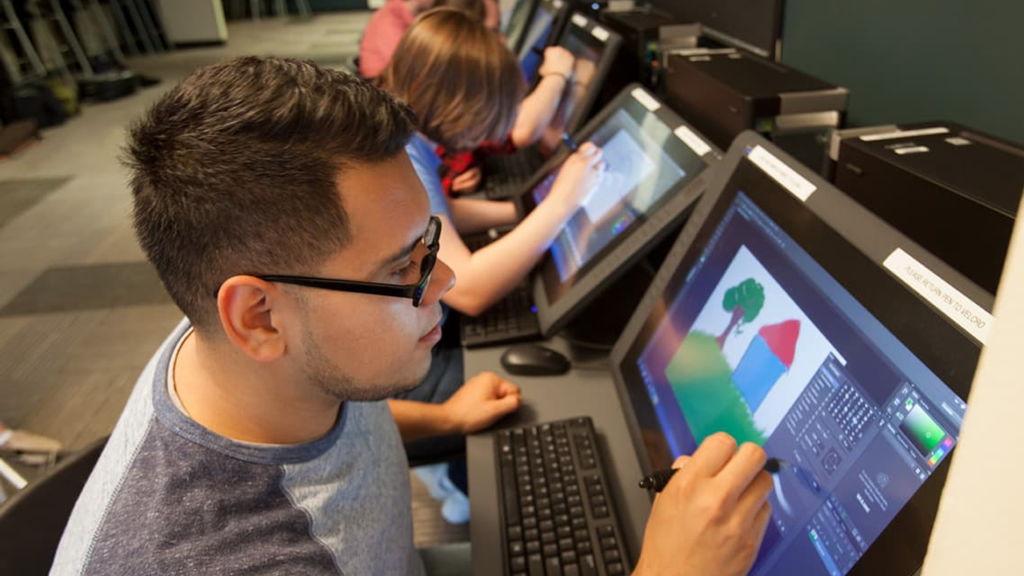Embarking on a career in video game design is a dream for many, but it often starts with one crucial step: obtaining the right degree. With the gaming industry’s rapid growth and evolution, knowing which academic path to pursue can be a game-changer. In this feature, we’ll explore the various educational avenues available for aspiring game designers. Whether you’re a creative visionary or a technical whiz, discover how to turn your passion for gaming into a professional reality.
Bachelor’s Degrees in Game Design
A Bachelor’s degree in Game Design is the cornerstone for embarking on a career in the video game industry, one of the most vibrant and rapidly evolving sectors of the digital economy. This degree not only equips students with a comprehensive understanding of game development processes, including programming, graphics design, storytelling, and user experience but also lays a solid foundation in the critical thinking and problem-solving skills necessary to thrive in this competitive field.
Prospective students should look for programs that offer a blend of theoretical knowledge and practical experience, such as project-based learning and internships with game development companies. These experiences are invaluable, as they provide insight into the industry’s dynamics, help build a professional network, and enhance a resume before even entering the job market. A Bachelor’s degree in Game Design typically covers a wide range of subjects, from the basics of coding and digital art to more advanced topics like artificial intelligence in gaming and virtual reality experiences.
Moreover, the landscape of game design education has broadened to include specializations within the field. Students can now choose to concentrate on specific areas of interest, such as mobile game development, game audio engineering, or narrative design, allowing for a more tailored educational experience that aligns with their career aspirations. The goal of these programs is not only to foster technical proficiency but also to cultivate the creativity and innovation that drive the industry forward.
Below is a table illustrating some of the core subjects typically covered in a Bachelor’s degree program for game design:
| Core Subject | Skills Acquired | Potential Applications |
|---|---|---|
| Programming Languages (e.g., C++, Python) | Game logic development, AI scripting | Game engines, Gameplay mechanics |
| Game Art and Animation | Character and environment design | 2D/3D modeling, Animation sequences |
| Gameplay Design | Designing engaging game mechanics | Puzzle creation, Level design |
| Storytelling and Narrative | Scriptwriting, Character development | Narrative-driven games, Cutscenes |
| User Experience (UX) Design | Interface design, User testing | Game menus, Accessibility features |
Choosing the right Bachelor’s degree in Game Design is a significant decision that can shape your future career in the gaming industry. It’s important to research and select a program that not only offers a comprehensive curriculum but also provides opportunities for hands-on learning and collaboration with peers and industry professionals. With dedication, creativity, and the right educational background, graduates can look forward to exciting and fulfilling careers in game design, contributing to the next generation of video gaming experiences.
Associate Degrees and Certifications in Video Game Design

The pathway to a career in video game design doesn’t always require a four-year degree. For many aspiring designers, an associate degree or various certifications can provide a solid foundation in the fundamentals of game design, development, and the use of industry-standard software tools. These programs are typically less time-consuming and more cost-effective, making them an attractive option for students eager to jumpstart their careers.
Associate degree programs in video game design focus on the practical aspects of creating games, including programming, graphic design, animation, and storytelling. The curriculum is designed to equip students with the skills needed to enter the workforce directly upon graduation. Additionally, certifications in specific programming languages or software suites such as Unity or Unreal Engine can further enhance a candidate’s employability by demonstrating specialized expertise.
For those looking to specialize or advance their knowledge in a particular aspect of game design, certifications offer flexibility and focus. They can be pursued independently or in conjunction with an associate degree, providing a tailored educational experience that aligns with the student’s career goals and the dynamic needs of the video game industry.
Exploring Educational Paths in Game Design
Choosing the right educational path is crucial for aspiring game designers. Whether through an associate degree or specialized certifications, students have multiple avenues to gain the necessary skills and knowledge. These programs not only cover technical aspects but also foster creativity and problem-solving, key components in successful game development.
| Program Type | Duration | Focus Areas |
|---|---|---|
| Associate Degree in Game Design | 2 years | Programming, Graphic Design, Animation |
| Certification in Unity | 6 months | Game Development, Scripting |
| Certification in Unreal Engine | 6 months | Visual Effects, Level Design |
| Certification in Graphic Design | 1 year | Photoshop, Illustrator |
| Associate Degree in Computer Science | 2 years | Programming, Software Development |
Master’s Degrees for Specialization
Pursuing a master’s degree in video game design can significantly enhance your expertise and open doors to specialized roles within the gaming industry. These advanced degrees are tailored for individuals seeking to deepen their knowledge in specific areas of game design, such as interactive design, game mechanics, or narrative development. A master’s program not only equips you with advanced theoretical knowledge but also provides practical, hands-on experience through project-based learning and industry placements.
Specialization at the master’s level allows for a deeper dive into areas that are crucial for the development of complex and engaging video games. Whether your interest lies in the artistic aspects of game design, such as animation and graphics, or the technical side, including programming and software development, a master’s degree can offer the specialized curriculum you need. For those looking to lead, degrees focusing on project management and team leadership within the context of game development are also available. This targeted education is essential for anyone looking to stand out in the competitive gaming industry.
Furthermore, engaging with cutting-edge research and the latest technological advancements in gaming through a master’s program can provide a significant edge in your career. The collaborative environment fosters innovation and allows students to work closely with professionals and peers who share a passion for video game design.
Exploring Advanced Game Design Technologies
Advanced degrees in video game design delve into the latest technologies and methodologies used in creating groundbreaking games. From virtual reality (VR) and augmented reality (AR) to artificial intelligence (AI) in game development, students are exposed to the forefront of gaming technology. This exposure is crucial for aspiring game designers aiming to push the boundaries of what is possible in video gaming.
| Specialization | Skills Developed | Potential Careers |
|---|---|---|
| Interactive Design | User experience, Prototyping | UI/UX Designer, Interaction Designer |
| Game Mechanics | Rule development, Gameplay balancing | Game Designer, Systems Designer |
| Narrative Development | Storytelling, Character development | Narrative Designer, Content Writer |
| Programming and Software Development | Coding, Engine customization | Game Programmer, Software Engineer |
| Project Management | Leadership, Resource management | Project Manager, Producer |
Skills Beyond Degrees in Game Design

While obtaining a degree in game design or a related field can set a solid foundation, the video game industry highly values practical skills and personal attributes that often go beyond formal education. Creativity, teamwork, and adaptability are indispensable traits in this dynamic field. To excel, designers must not only be proficient in technical skills like programming and graphic design but also possess a deep understanding of game mechanics and storytelling. This blend of creativity and technical ability enables designers to create immersive and engaging gaming experiences.
Moreover, the ability to work effectively in a team is crucial. Video game design is a collaborative process, involving artists, programmers, writers, and testers. Communication skills and the ability to accept and integrate feedback are essential for refining game concepts and ensuring that the final product aligns with the vision of the team. Additionally, staying abreast of the latest trends and technologies in the gaming industry is vital. A passion for gaming and a commitment to continuous learning help designers adapt to new tools and methodologies, keeping their work innovative and relevant.
Finally, project management skills are also highly valued in the game design industry. The ability to plan, organize, and manage resources effectively can make the difference between a project’s success and failure. Whether working in a large studio or as an independent developer, the capacity to oversee a project from concept to completion is invaluable.
| Skill | Importance | Example Application |
|---|---|---|
| Creativity | High | Developing unique game concepts |
| Technical Proficiency | High | Programming and graphic design |
| Teamwork | Essential | Collaborating with other departments |
| Communication | Crucial | Integrating feedback into game design |
| Project Management | Important | Overseeing a game from concept to completion |
Emerging Trends in Game Design Education
The landscape of game design education is rapidly evolving, with new trends emerging that reflect the industry’s dynamic nature. One such trend is the integration of virtual reality (VR) and augmented reality (AR) into the curriculum. These technologies offer immersive experiences that are becoming increasingly important in game development, pushing educational institutions to incorporate them into their programs. Another significant shift is the emphasis on cross-disciplinary studies. Today, game design students are encouraged to take courses in psychology, storytelling, and user experience to create more engaging and emotionally resonant games.
Furthermore, the rise of indie game development has led to a focus on entrepreneurial skills within game design programs. Students are not only learning how to create games but also how to market them and manage a business. This is crucial in an industry where independent developers can achieve global success with a single hit game. Additionally, there’s a growing recognition of the importance of diversity in game design, prompting institutions to foster a more inclusive environment where students from all backgrounds can contribute their unique perspectives to the gaming world.
Enhancing Creativity and Technical Skills in Game Design Education
As the video game industry continues to expand, educational programs are adapting to prepare students for the challenges and opportunities ahead. This involves not just teaching the latest software tools, but also nurturing creativity, problem-solving abilities, and an understanding of the global gaming culture. By doing so, educators aim to equip the next generation of game designers with the skills needed to innovate and thrive in this competitive field.
| Trend | Impact on Curriculum | Skills Developed |
|---|---|---|
| VR/AR Integration | Inclusion of immersive technology courses | Technical proficiency in VR/AR |
| Cross-disciplinary Studies | Collaboration with departments like psychology and literature | Creative storytelling, user engagement |
| Entrepreneurship | Business and marketing modules for game developers | Business acumen, marketing strategies |
| Diversity and Inclusion | Programs aimed at broadening student demographics | Cultural awareness, inclusivity in game design |
| Global Gaming Culture | Studies on international gaming trends and consumer behavior | Global market understanding, design for international audiences |
The field of game design is at a thrilling juncture, with educational institutions playing a pivotal role in shaping the future of the industry. By staying ahead of these emerging trends, these programs ensure that graduates are not just capable of meeting the current demands of the gaming world but are also equipped to innovate and lead in new directions. As the industry continues to evolve, so too will the educational pathways that lead to success within it, promising an exciting future for aspiring game designers.

Is a game developer and writer with over seven years of experience in the gaming industry. Specializing in game design, development trends, and emerging technologies. He has worked on indie game projects and larger development teams, sharing his insights to help aspiring developers navigate the evolving world of game creation. Ethan’s articles focus on practical tips, game mechanics, and tools to inspire creativity in the gaming community.






